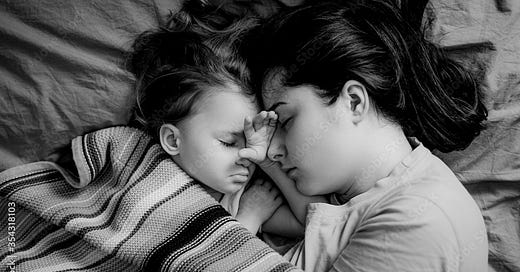Crappy Sleep Is An Ancient Feature of Humanity
So maybe we should all stop worrying about it so much
Sleep is this beautiful, passive, restorative process. Most people in most cultures know this. In Hadza society (a group of hunter-gatherers living in Tanzania) where sleep has been studied extensively, there is no word for “insomnia” because apparently it does not exist. People sleep when they are tired, but they don’t sleep all that much (maybe 6 or 7 hours), and their sleep is frequently interrupted. Mostly, they report feeling fine the next day. It’s no big deal. In the contemporary West, sleep has become this thing we want to control and optimize, just like so many other domains of our lives. The problem is, sleep is a hard thing to control, especially for a new mother. Most of the messaging we hear around sleep - how much of it we need, how to optimize sleep quality, how lack of sleep effects our health - is clearly aimed at the childless members of our society. The Tiktok wellness trend of “sleepmaxxing,” where sleep influencers tape their mouths shut, insert nostril expanders, and take all manner of unproven supplements in order to allegedly improve sleep quality sums up our Western approach. In short, it’s the commercialization of sleep. We’ve taken this lovely, natural thing that anyone can do without thinking and we’ve made it into a product. The worst part is: our obsession over sleep is actually part of why we are such insomniacs.
One of the things that I love about studying human evolution and hunter-gatherer societies is that it provides us with a kind of bullshit detector for modern parenting and wellness advice. When I feel skeptical of a new trend, I like to ask myself: how did humans do this for hundreds of thousands of years before we start getting all kinds of mixed messages from the experts? If the answer is way out of alignment with what we are being told is optimal in the contemporary West, then it’s worth looking into. Sleep is one of those areas.
Sleep is still a relatively poorly-understood domain of biological science, but we do know from direct experimental evidence that sleep is critical for working memory, attention, decision-making, and visual-motor performance (source). Sleep also appears to play a critical role in purging byproducts of metabolic activity from the brain and allows for growth and repair of the body by triggering the release of growth hormones and heightened immune function during sleep (source). So, sleep is important, but how much of it do we really need? How did our ancestors sleep and what do we know about how it affected their health?
Keep reading with a 7-day free trial
Subscribe to MOTHERHOOD UNTIL YESTERDAY to keep reading this post and get 7 days of free access to the full post archives.




